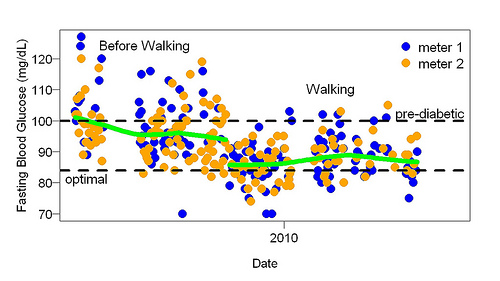This morning I woke up feeling very refreshed and in a good mood. I’d slept about six hours. I’d fallen asleep within seconds of turning off my bedside light. This is what usually happens. I almost always sleep this well. Yet I don’t avoid caffeine during the day (I drink a lot of tea) nor artificial light at night (I do avoid fluorescent light at night). For a large chunk of my life my sleep was much worse. I never woke up feeling well-rested. I often woke up quite tired but unable to fall back asleep. A few hours later I’d fall back asleep and sleep a few more hours, much like the biphasic sleep called segmented sleep. Which is more natural — my current sleep or segmented sleep? As I blogged, several scientists have said that segmented sleep is more natural.
I’m returning to this topic and sort of repeating myself because sleep is so important, “ almost everyone I [a NY Times writer] know complains about sleep,” and the common cold so common. (When I improved my sleep I stopped getting colds.) Here, in chronological order of discovery, is what I’ve learned improves my sleep:
1. Aerobic exercise. When I started swimming, I noticed that I fell asleep much faster — within a minute rather than within several minutes. Aerobic exercise didn’t solve the bigger problem of waking up tired, however.
2. Skipping breakfast. This reduced early awakening. If you have any doubts about this, read about anticipatory activity in lab animals.
3. Seeing faces in the morning. Perhaps this deepens my sleep. It certainly makes it easier to go to bed in the evening (I stop wanting to do anything) and makes me wake up optimistic and looking forward to the day. The difference in how I feel when I wake up is like the difference between black and white and color. These days I watch about an hour of bloggingheads on a 22″ monitor starting around 6 am.
4. Standing. I stand on one bent leg to exhaustion at least twice. Before that I got a similar effect by standing 8 hours or more, which was too hard to do every day.
5. Morning light. Every morning I go outside about 8 am. I try to stay outside at least 1 hour and ideally more.
6. Animal fat. I eat half a stick of butter (60 g) per day.
Maybe the 3 tablespoons of flaxseed oil I drink every day also helps.
Each one of these six factors probably reproduces Stone Age life, when people got a lot more exercise, didn’t eat breakfast, chatted with their neighbors in the morning, etc. Were all six factors set at Stone Age levels for the Western Europeans that Ekirch writes about or Thomas Wehr’s subjects (both of whom had segmented sleep)? Of course not. Had all six been at Stone Age levels, the segmented sleep seen by Ekirch and Wehr might have disappeared. As my segmented sleep disappeared.
My sleep still has room for improvement. When I stood for 9 or 10 hours I woke up astonishingly well-rested. I felt scrubbed free of tiredness. In the middle of the day, eight hours later, I would marvel how rested I felt. The problem with standing more now is that if I stand on one bent leg more than twice per day my legs get stronger and stronger and it starts to take a long time (e.g., 20 minutes) to reach exhaustion. I’m also unsure about the best amount of animal fat. More might be better.
Comments that the night is long and sleep is short ignore that we can see by moonlight and starlight and that people chat after dark. In contrast to this experiment with no artificial light, by J. D. Moyer, the things I do to improve my sleep produce no bad effects. And I sleep only six hours per night, which Moyer found isn’t nearly enough.
Thanks to Heidi for the Moyer and NY Times links.
